Common Cause: the birth of modern citizen advocacy.
- Exhibited by
- Roger Craver.
- Added
- June 20, 2012
- Medium of Communication
- Press advertising.
- Target Audience
- Individuals.
- Type of Charity
- Human rights & civil liberties.
- Country of Origin
- USA.
- Date of first appearance
- August, 1970.
SOFII’s view
To every generation falls the task of renewing and defending liberty and equality.
As the Occupy Wall Street movement escalates in the United States and around the globe, it is well to remember that we’ve been here before and that fundraisers can play a key role in advancing citizen action and making social change.
Creator / originator
John Gardner and Roger Craver.
Summary / objectives
During the 1970s in the USA, virtually all liberal social change was funded either by labour unions or by wealthy individuals. So if an organisation or a movement had an agenda that displeased those large funders, it wasn’t going to go anywhere. Similarly, all politics until the middle of the 1960s was funded by the parties and, again, wealthy donors. There was a great deal of centralised control over the sources of money – and money is important simply because it represents freedom to set your own agenda. John Gardner had other ideas. He wanted to organise hundreds of thousands of small gift donors and members to fund an organisation that was not dependent on a handful of large donors. This was a revolutionary idea at the time – and one that drew cynical laughter and derision from the politicians and pundits inside the beltway of Washington, DC. Roger Craver, then a major gift fundraiser at George Washington University, became Common Cause’s first employee. His task: to figure out how to ‘raise lots of money in small gifts from lots of people’.
Background
In 1970 with the war in Vietnam raging, with women denied basic economic rights, with the environmental degradation beginning to appear on folks’ radar screens and with Washington, DC paralysed into inaction, the people took to the streets and took to organising and funding citizen action movements to change the world around them for the better.
The first organisation created in this period of social upheaval was Common Cause, a citizens lobby founded by John Gardner, a prominent cabinet member in the Johnson administration, who had just resigned over the war in Vietnam.
At the outset, there wasn’t a great deal known about how to raise money from individuals. We didn't have planners and we didn't have systems specialists.
In fact, we didn't even have mailing lists, we didn’t know where to get the names of prospective donors. In those days there weren’t lists easily available of progressive donors wanting to make social change because, one, there weren’t many and, two, organisations didn’t exchange names. So we had to figure out how to build mailing lists from scratch.
I remember sitting in the reading room of the Library of Congress looking at newsletters and magazines and saying, ‘Well, if someone would read this, they probably would be interested in Common Cause’.
I also went to an early Common Cause meeting in Connecticut and when I went out to the car park after the meeting I was startled by the number of Volvos. I thought, ‘Well, you know, maybe there’s some demographic ….’ In those days, ‘demographic’ was a pretty new word and not used much in direct response work. We rented the Maryland registry of vehicles list for Volvo owners and tested it in Montgomery County and it worked well. Then we tried it in some other states and it kept working.
Volume was another major problem. Back then envelopes were addressed in two ways. You could use Addressograph machines, which were steel plates that imprinted addresses, but we didn’t have anyone trained to run them. Or you could hire someone – usually someone working from home – to address 500 envelopes a day. We used to drive round in the evening to collect them from various houses. Getting a million piece mailing out overnight was impossible.
On 18 August 1970, we put thousands of direct mail letters signed by John Gardner into the postal system and also launched the organisation with a full-page ad that first appeared in The New York Times and then in papers across the nation.
The letter (see an extract, left) went on to request that the reader become a member of this new organisation by taking out a subscription or making a contribution of $15 – an offer virtually unheard of up until then.
The headline on the full-page that appeared in The New York Times stated the case for support succinctly and powerfully:
Everybody’s organized but the people.
That headline was all it took to trigger the vast movements of the 1970s for social and political change.
To mark the first anniversary and the period of rapid growth – but more importantly to shine the spotlight on the naysayers – we ran another series of full-page ads across the country proclaiming:
They laughed when we started Common Cause
But they’re not laughing now.
Special characteristics
Mailing lists built from scratch, never accepting that something couldn’t be done and finally being able to use a headline that cocked a snook at the cynics and pessimists.
Influence / impact
It was the founding and success of Common Cause, coupled with the inordinate social unrest and despair across all classes of society that led to the founding of dozens of other social change, environmental and human rights organisations – the National Organization for Women, Greenpeace, The National Abortion Rights Action League, Ralph Nader’s Public Citizen, Environmental Defense Fund and dozens more.
Details
See Background.
Results
In just a few months the organisation grew to 100,000 fully paid-up members and by the following August stood at 200,000 and was continuing to grow.
Merits
Common Cause was started to give ordinary individuals a way to make their voices heard. The fundraising campaign in turn took the power from a small number of wealthy people and mighty institutions to make or break a good cause and gave it to the individual.
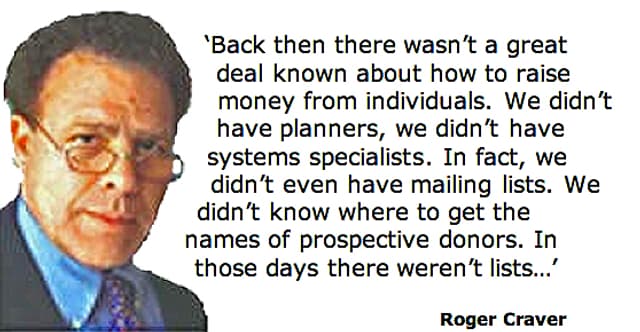
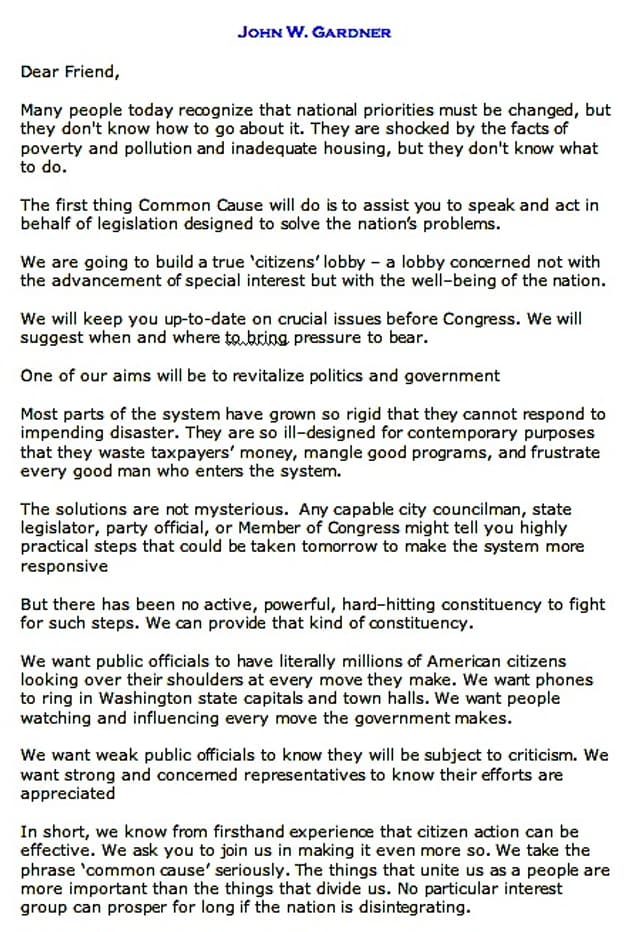 View original image
View original image
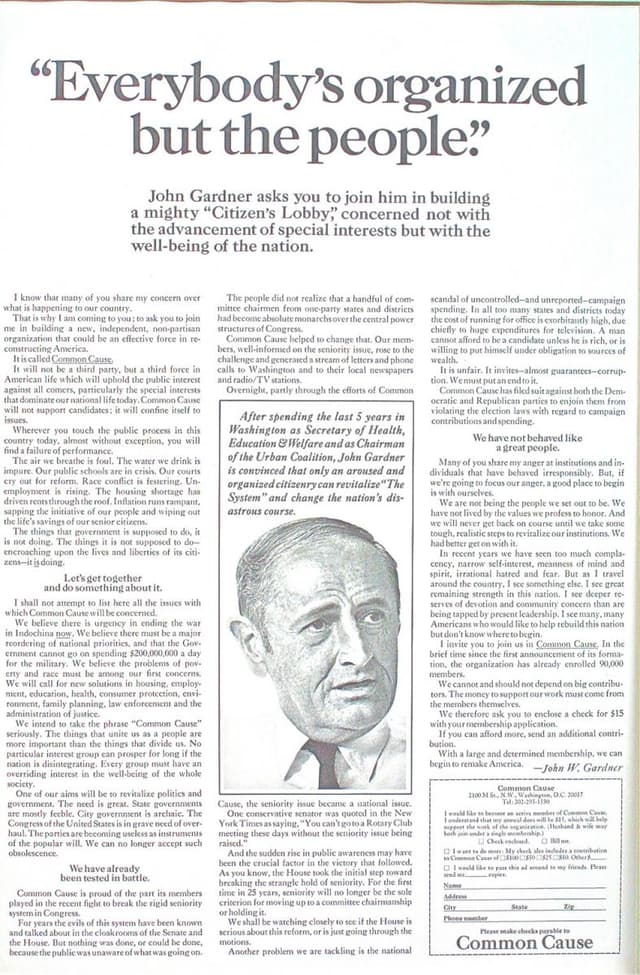 View original image
View original image
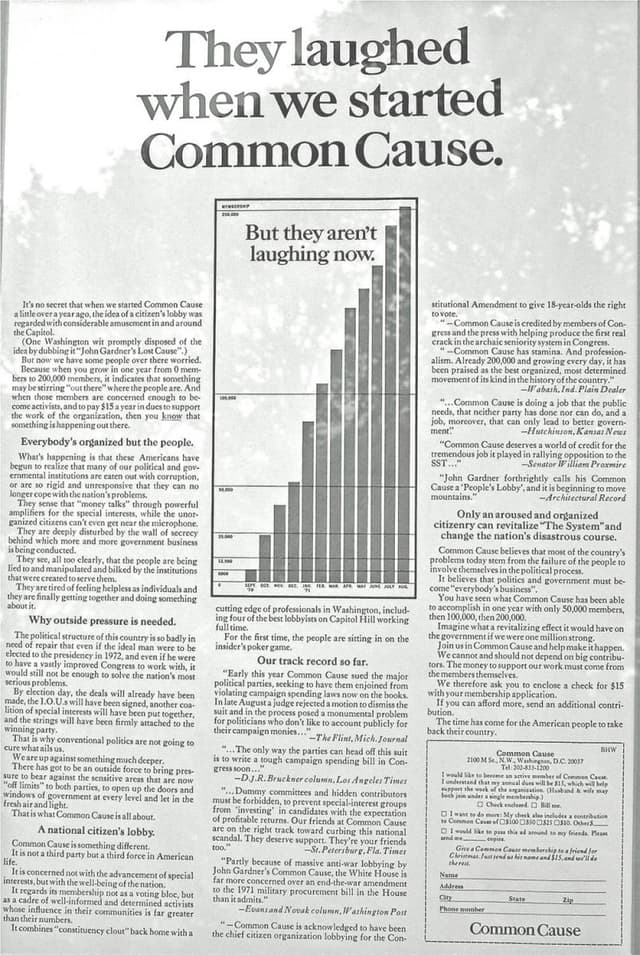 View original image
View original image
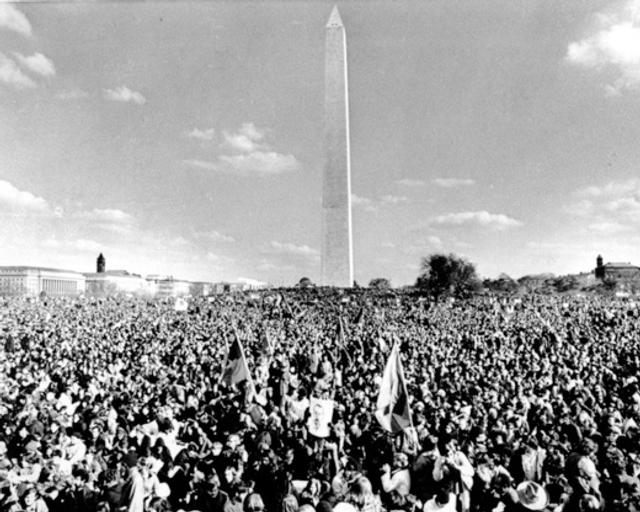
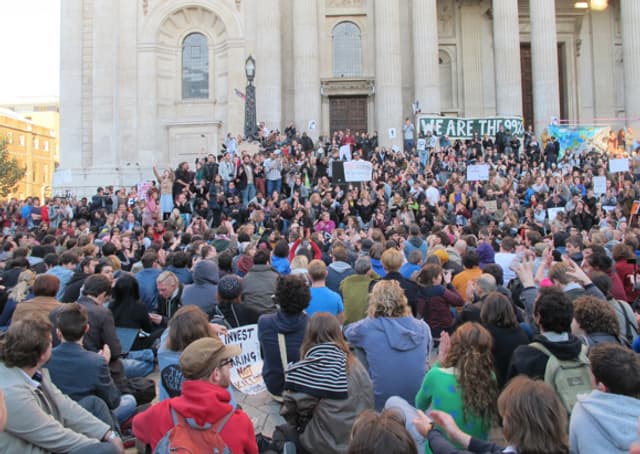
Also in Categories
-

















